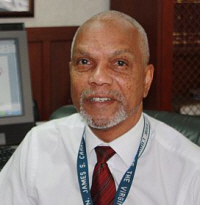A regular Source feature, Undercurrents explores issues, ideas and events as they develop beneath the surface in the Virgin Islands community.
The Virgin Islands’ high rate of incarceration is “incredible” to the man responsible for its prison at Golden Grove, “embarrassing” to a Superior Court judge, but “not surprising” to either of them, to the presiding judge – or to many others involved in the legal system.
Officials reacted last week to a report by the International Centre for Prison Studies that ranked the United States as the country with the per capita highest number of its population in jail – 716 for every 100,000 – and placed the U.S.V.I. in the number four spot, just below St. Kitts-Nevis and the Seychelles. The territory is listed as having 539 prisoners per 100,000 people.
The report is dated February 2013, but received little attention until it got widespread circulation last week in the wake of U.S. Attorney General Eric Holder’s push for reducing the U.S. numbers.
Like others interviewed for this article, Judge James S. Carroll said the numbers in the report were consistent with his experience of the situation and that many factors play a role.
One major factor, he said, is that “There’s always this push to be tough on crime.”
That push can result in lawmakers establishing mandatory minimum sentences for particular types of crime, generally ones that are widely perceived as getting out of control, in an attempt to deter future instances.
For example, a person convicted of using a firearm in the commission of a violent crime faces a mandatory minimum sentence of 15 years in prison, with no possibility of parole or early release, Carroll said. The same person would face a mandatory minimum of half that – 7.5 years – had he used a knife or any other weapon.
Carroll indicated it would be improper to discuss specific cases, but he said there have been some in which he was forced by statute to give a longer sentence than he felt was warranted by the particular circumstances.
“It’s basically these mandatory sentences that put us in this category of being No. 4,” Carroll said.
Acting Public Defender Robert Leycock concurs. “I think the mandatory sentencing has a lot to do with it,” he said.
The statute requires 10 years for second degree rape; that is, sex with a minor, he said. It’s a serious crime, he stressed, but in cases in which one willing partner is just under the legal age and the other slightly over it, the penalty seems harsh.
Likewise, he said, distributing drugs of any kind can net a sentence of 15 years, but it makes no distinction between types of drugs, and “that’s kind of high for marijuana.”
“Just locking people up, we’re still not basically solving anything,” said Presiding Judge Darryl Donohue.
He noted that the territory’s small size may have somewhat skewed its standing of fourth place but added that he “wouldn’t be surprised” if the rating were accurate.
He agreed that “all sentences have to be tailor-made to the individual as he stands in front of you.” But he stopped short of blaming mandatory minimums for the high incarceration rate.
“Personally I think we’re losing too many of our kids into the system,” Donohue said.
Many have little education and few skills to create a life in the community and instead drift into crime and the justice system, he said. Once there, it’s hard to get out.
“We don’t really transition folks,” he said. There is no halfway house in the Virgin Islands where people who have been released from prison can get help re-entering the community.
Basil Richards, warden at Golden Grove Correctional Facility, also noted the lack of a halfway house and said the recidivism rates in the territory are very high, both in the St. Croix and the St. Thomas-St. John districts.
In the years 2011 and 2012, a total of 250 prisoners were released, according to figures Richards provided. And a total of 99 were re-arrested. That’s a recidivism rate of 39.6 percent.
He listed a number of reasons for the problem. The average education level of the territory’s inmates is fifth grade; many have no personal support system; many lack marketable skills, many are addicted to drugs. Additionally, there is a lack of community programs designed to help them.
“We need a real public discussion on this,” Carroll said.
Donohue agreed.
“It has to be a full court press,” involving community leaders, policy makers, clergy and all stake-holders, he said. It might take the form of town hall meetings.
The judiciary is not really in a position to spearhead such a discussion, Carroll said. One possible sponsor would be the V.I. Bar Association.
Bar president Ernest E. Morris, Jr., who is also assistant legal counsel to the Legislature, said the bar has not taken a position on mandatory sentencing. As for spearheading a forum on that or on incarceration rates in general, “public discussion in general is good.”
“Well, there’s a national discussion taking place right now,” said Leycock. “So, yes, we could have a discussion in the territory now.”






